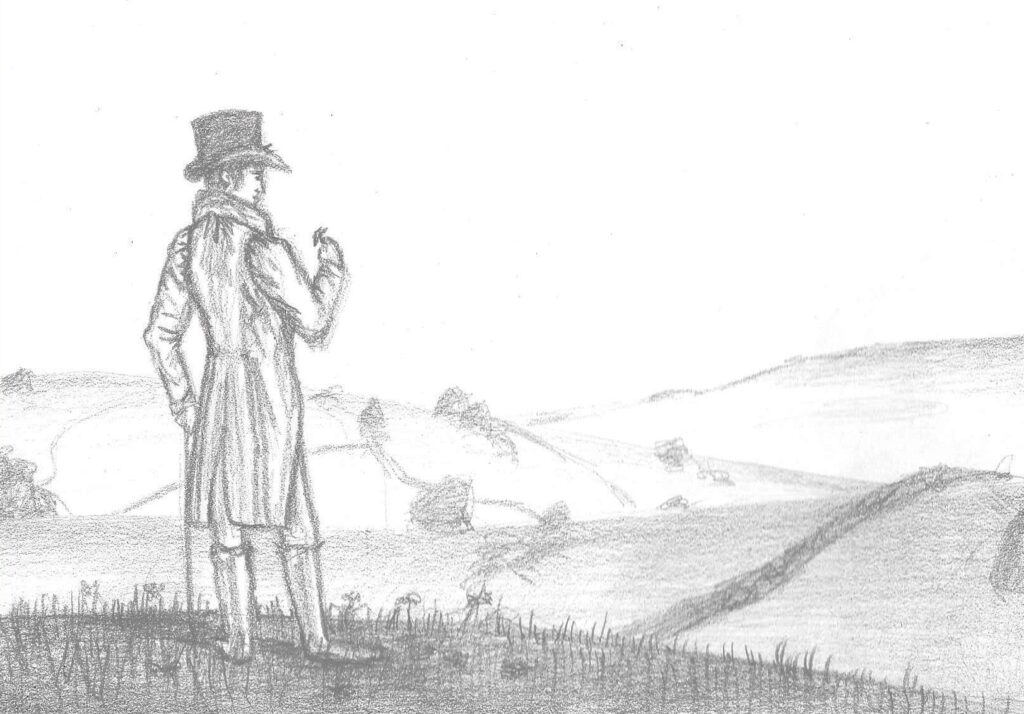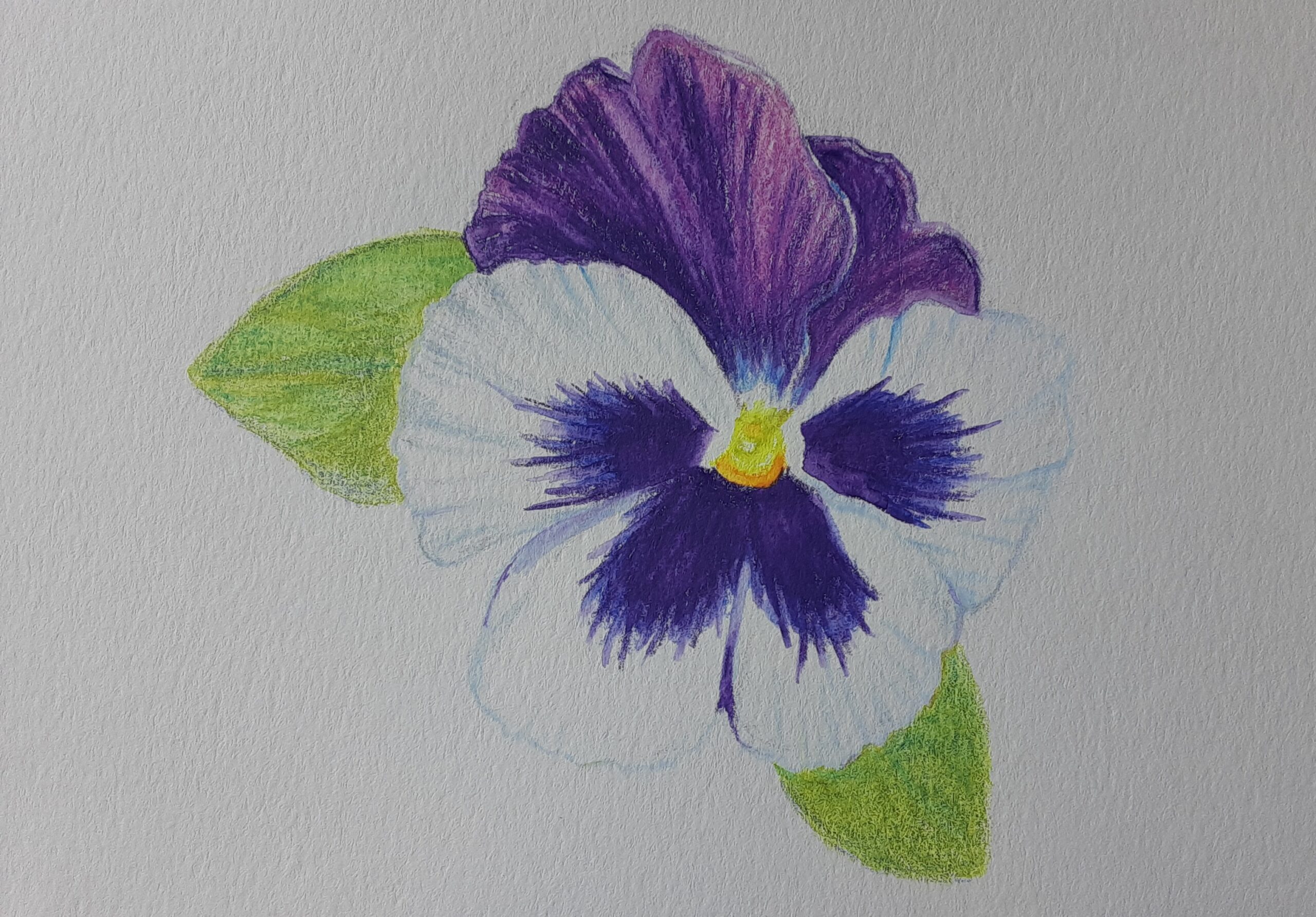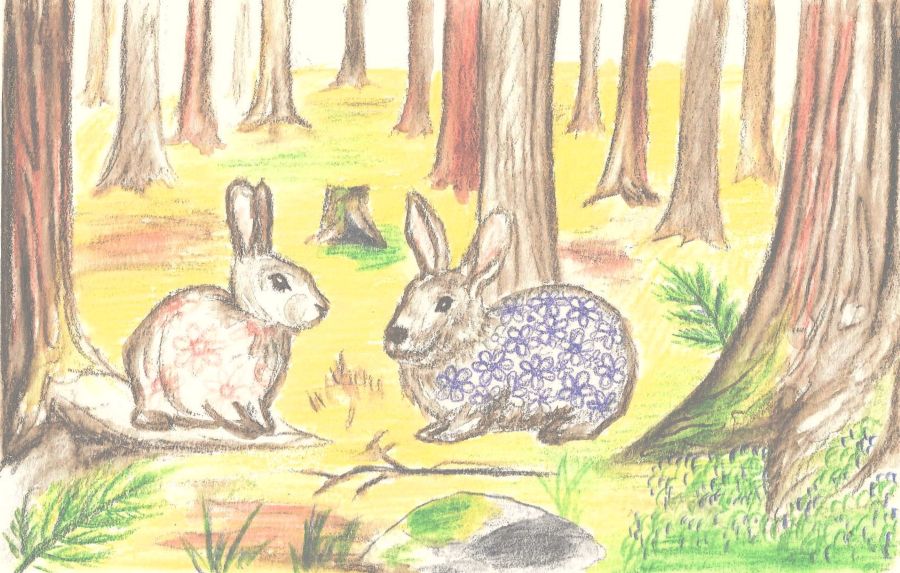
Reading a poem is like painting a watercolor landscape– it happens one layer at a time. The first read through is laying the first wash, a hazy mist which doesn’t mean much on its own. But each successive wash builds up the color, adds depth and detail. Each thin layer finally builds into something which could not have been laid down all at once.
Reading Wordsworth’s poetry often takes this kind of patience, as it is densely packed with vivid imagery and archaic phrases. But I think the final picture is worth the process, because I think he offers a unique image of the world and human beings. His Ode gives us a fascinating look into his worldview.
The poem begins in a moment of reflection. The speaker is overcome with a sense of loss. As a child, everything in the world appeared to him “apparelled in celestial light.” While he now still finds beauty in things, the glory has gone out of them.
Stanza three shifts to the present moment, outside in a field in May. The world is in blossom, and is united in joy; the birds, flowers, children and shepherds all seem swept away in the communal spirit of celebration. The speaker, while moved by the beauty of the scene, is set apart by a “thought of grief”. He feels that it is wrong of him to be sad when the world is rejoicing, but the sights themselves bring him thoughts that he cannot ignore. Out of the whole scene, his attention is seized by a single flower:
The Pansy at my feet
Doth the same tale repeat:
Whither is fled the visionary gleam?
Where is it now, the glory and the dream?
The pansy (whose name comes from the French word pensée, meaning “thought”) is an almost insignificant part of the landscape, and yet its delicate beauty is powerful enough to launch Wordsworth into his entire theory of human existence.
Far from a tabula rasa beginning, Wordsworth evokes an image of birth almost as a comet falling to earth: the soul is in heaven, and when it comes to earth born as an infant, it has a memory of its heavenly existence. Acquiring knowledge of earth and human life replaces that heavenly memory little by little, until an adult’s existence is no longer colored by it. The whole poem is Wordsworth playing with light imagery. The light of heaven, of childhood, fades into “the light of common day” for the adult.
Wordsworth mourns this transition from childhood to adulthood, which occurs both actively and passively. He describes “the years” bringing the “inevitable yoke” of adult concerns, but also the child striving to take on adult roles. He also points out the irony that the infant’s mind contains all the knowledge of God and the world which adults “are toiling all our lives to find,” but the infant cannot speak and communicate this treasure. As we acquire language, we use it to mimic and explore the earthly world. Though he may be the “best philosopher,” the infant growing into a child does not seem to know that this inborn knowledge will be lost. Instead he is filled with curiosity about the world, and learns about it by playing at adult roles.
In this poem Wordsworth relentlessly insists on keeping both the sorrow and joy of human existence both in sight. In one moment, he makes a sorrowful lament:
Thou little Child, yet glorious in the might
Of heaven-born freedom on thy being’s height,
Why with such earnest pains dost thou provoke
The years to bring the inevitable yoke,
Thus blindly with thy blessedness at strife?
Full soon thy Soul shall have her earthly freight,
And custom lie upon thee with a weight,
Heavy as frost, and deep almost as life!
Then, right after this bleak image of the adult being encased in the ice of responsibility and social custom, the next line begins with “O joy!”. Far from being extinguished, he compares the lost state of bliss to a fire that smolders in still-living embers. We learn then that his chastisement of the child at trying to grow up is half hearted, that it is too simplistic to speak of what comes after childhood only as a burden, a heavy frost.
Not only do we retain a spark of the inborn beauty within us, but there is actually a lot gained in the somber adult years. The world no longer glows with the same light, but the impression that it made on us as children becomes a new beacon, enclosed in memory. It is the “first affections” and “shadowy recollections” that become the “fountain-light of all our day” and allow us to bear the weight of adulthood, and even develop ourselves further. The years take away the “splendour of the grass” and “glory in the flower,” but they also bring “the philosophic mind.” The adult can develop a rich inner world, abundant with reason, faith, and connection.
Not only is Wordsworth still moved by nature, but in some ways his love for it has deepened:
And O, ye Fountains, Meadows, Hills, and Groves,
Forebode not any severing of our loves!
Yet in my heart of hearts I feel your might;
I only have relinquished one delight
To live beneath your more habitual sway.
I love the Brooks which down their channels fret,
Even more than when I tripped lightly as they;
He now loves nature not with the immediacy of childhood, but through layers of memory and contemplation. A beautiful sunset now takes on a “sober colouring” through his eyes that have seen death, and so the image is both beautiful but also a metaphor for mortality. So does everything in the landscape point to something deeper, and it is the great joy of the poet to see all of these layers of significance.
Thus it is with the pansy, which we encountered at the end of stanza four. Because of his developed poetic sensitivity and the capacities of the “human heart,” the sight of this flower becomes the gateway for this entire reflection, and “can give / Thoughts that do often lie too deep for tears.” What the flower provokes is beyond tears, more complicated than just sadness. It provokes something which requires this whole poem to express. What seem like contradictions along the way are all a part of the largeness, the delicacy of this experience, which really does change in us from moment to moment. A word like ‘bittersweet’ expresses duality, but really points us towards something deeper, more multifaceted than just a mixture of joy and sorrow.
This poem encompasses the bittersweetness of witnessing a joyful moment while being aware of suffering and mortality. It also deals with the duality of experience as an adult, loving the world and yet being separate from it, developing the inner life of the mind which serves to elevate experience but also acts as a barrier between the self and the object examined. Though he highly values reflection, ultimately Wordsworth has to be defiant against his own melancholy. In the end he is mourning something which by its nature can never be fully lost. To get lost in a cycle of mourning instead of rejoining the world, he would cast aside the connection that he values. He would extinguish the embers by not acknowledging them. Thus, there always needs to be a balance between reflection and receptivity to the world.
It is really a beautiful poem, and it is delightful to have lines from it pop into one’s head while enjoying the fresh spring air. So go find a copy of it, and a meadow to read it in.



One response to “Poetry for Springtime: William Wordsworth’s “Ode: Intimations of Immortality from Recollections of Early Childhood””
Which lines are the most powerful for you? Let me know!